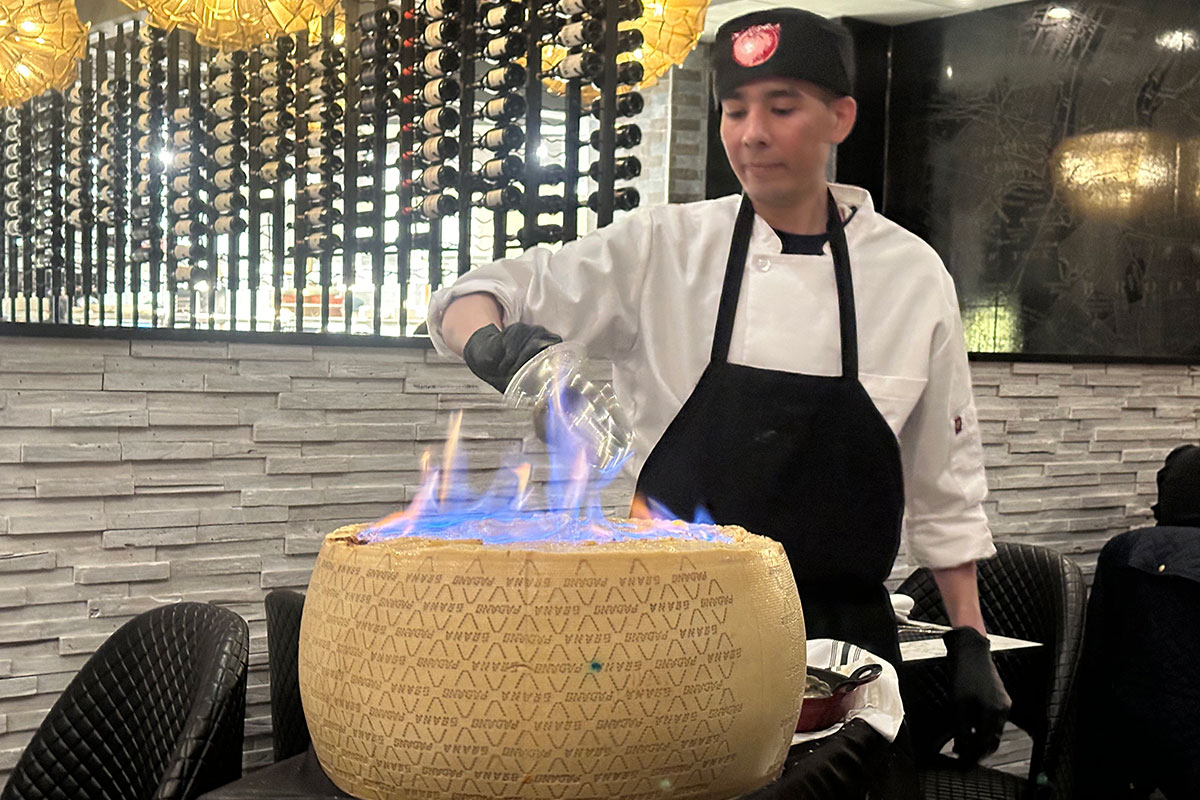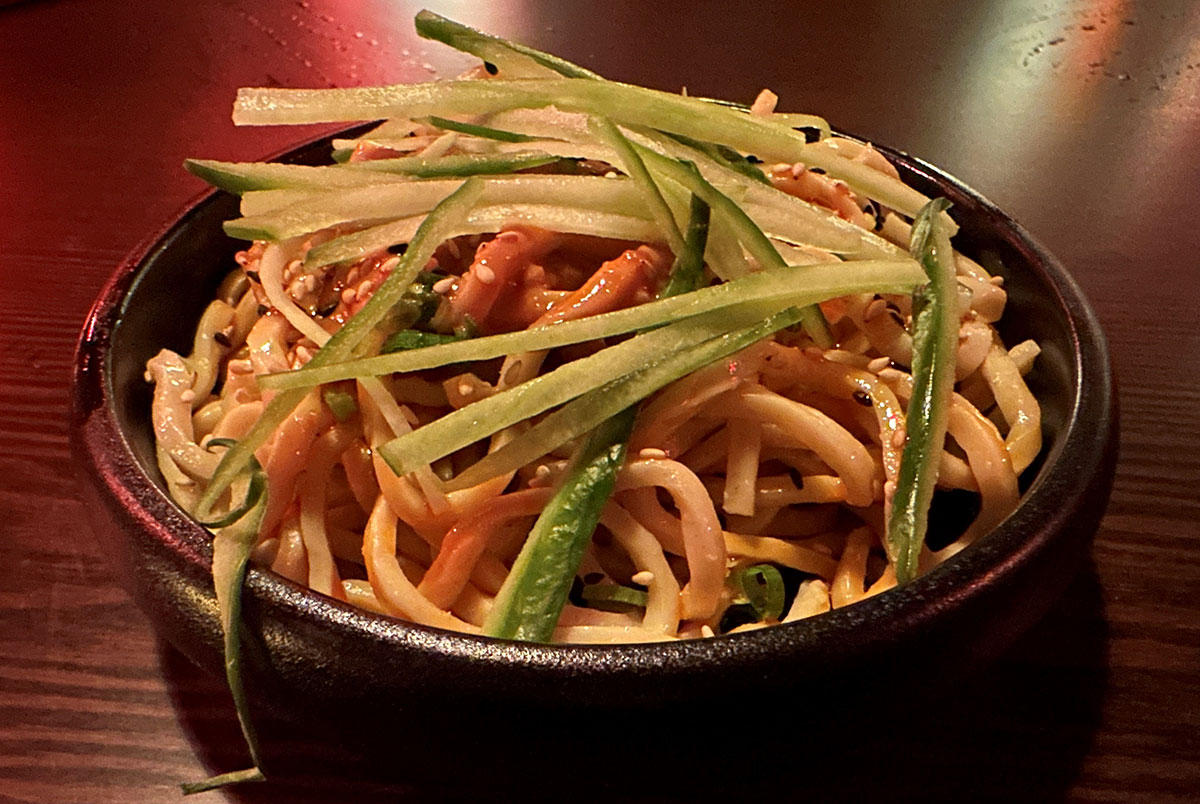DelMarVa’s Southern Cafe & TapHouse misrepresents the beauty of eating locally.
by Stefanie Gans / Photos by Kyle Martell
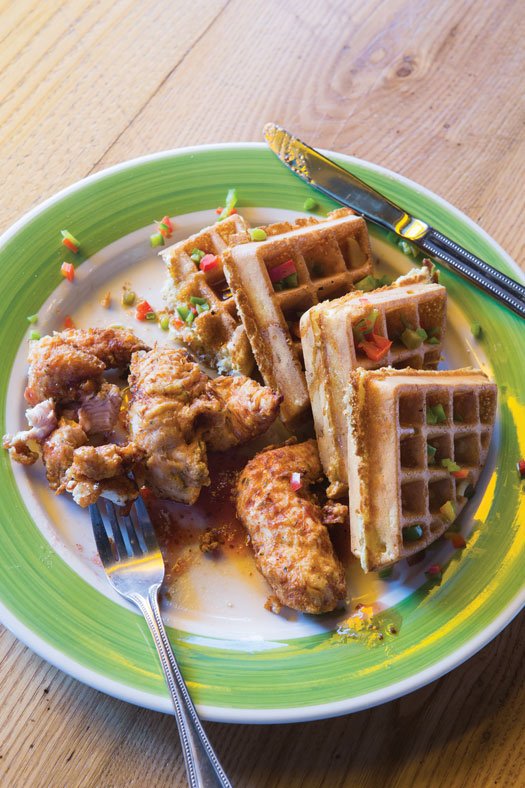
The Delmarva Peninsula is a stretch of land 170 miles long between Delaware, Maryland and Virginia. The waters of the Chesapeake Bay and the Atlantic Ocean lap onto the fertile soil. A new chain of restaurants, DelMarVa’s Southern Café & TapHouse, represents neither this region’s significant contribution to well-raised meat, seafood and vegetables, nor the South’s proud heritage of heirloom grains and hog worship.
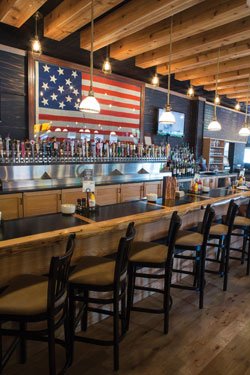
Posted at the restaurant and on its website, DelMarVa’s menu “centers around the comfort foods that have risen up in and around the Delmarva Peninsula over the years since John Smith founded Jamestown. Our guests come away satisfied with our traditional recipes and the careful cooking and presentation.” The mission reads as if customers should expect locally sourced meats and produce. Instead, this is a business venture positioned for expansion, not a restaurant dedicated to authentic cuisine. While not every restaurant needs to provide fine dining and inspired cuisine, a good meal is mandatory. DelMarVa’s offers none of the above, and with an onslaught of DelMarVa’s Southern Cafés headed for the area, it’s time to evaluate.
An interpretation of chicken and waffles shows Tenderjacks® (bought by DelMarVa Brands Inc.) chicken tenders instead of using a brined-floured-fried thigh. The breaded tenders offer no crunch against the soft waffle, garnished with raw red and green bell peppers and a cloying peach-cranberry marmalade. And why is there both syrup and jam?
The shrimp and grits offer nothing better. Congealed grits sit in one large clump with andouille sausage mixed into what tastes like canned chili. A parbaked (finished in a convection microwave), dry—certainly not buttery or flakey—biscuit balances on the side of the plate, an out-of-place accompaniment to a New Orleans-style dish.
The bright spot: The TapHouse’s beer list reads as a who’s who of craft brews nationwide.
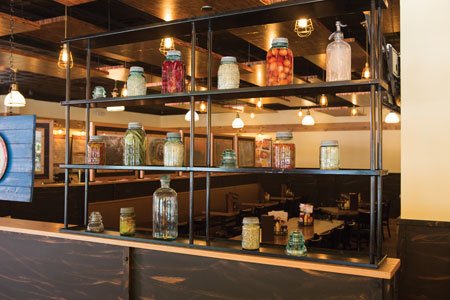
Paul Stratmeyer and David Levitt’s time in the corporate food world (Outback Steakhouse, Carrabba’s, Maggie Moo’s) reverberates in the positioning of DelMarVa’s. They co-opt the farmhouse chic aesthetic that comprises the look of restaurants adhering to the tenets of seasonal cooking (farm-adoration, seasonal devotion and rustic simplicity) and use it to sell subpar food tagged with location-specific dishes conjuring feelings of place and truth, but ultimately avoid authenticity.
The chicken demonstrates the disconnect. Stratmeyer uses the word “local” when describing his chicken: “Virtually all the chicken is from Delaware.” But in today’s food language, local connotes pasture-raised animals. Half of Stratmeyer’s chicken supply is from concentrated animal feeding operations. “Would we rather everything be grass-fed? Absolutely,” Stratmeyer explains. “But I do like the fact that if I have to buy an item I don’t have to go to Arkansas to get it. I can get it here. Employ the people here.”

Stratmeyer understands the game. “We’re chasing that kind of same model,” Stratmeyer says of the farm-to-table set-up. “We’re trying to straddle the fence.” He named his restaurant after two regions known for a particular type of food, yet DelMarVa’s sells watered-down versions of classics. DelMarVa’s, as both a fast-casual restaurant and a sit-down establishment, must hit certain price points and because of that, quality suffers.
Roseda Black Angus Farm, where cattle roams on grass north of Baltimore, provides DelMarVa’s beef. It is local and pasture-raised, yet the slider arrives pink-less and flavorless.
Stratmeyer craves what he calls a “Southern flare, that comfort food, relaxed, laid-back place.” And they want a lot of them. DelMarVa Brands is an ambitious company, opening three DelMarVa’s Cafés—Sterling, Leesburg (formerly Tenderjacks®) and Baltimore—in less than a year and not nurturing the flagship to mature into something worth replication. DelMarVa’s will open in Bel Air, Md. later this year,with Arlington and Quantico in 2014. Stratmeyer’s goal is seven more stores in five years. “I think the region could handle 25 locations,” he says.
Problems persist throughout the menu, in creations that do not honor this area, such as the mac and cheese skillet with avocado, bacon and tomato. The tropical avocado, not steeped in Mid-Atlantic or Southern cuisine, doesn’t enhance the dish, as the buttery texture mimics the soft noodles, and vanishes in the one-note melted cheese. The tomatoes were mealy, as they always are when it’s not late summer. The bacon helps, but the pig can’t save the dish.
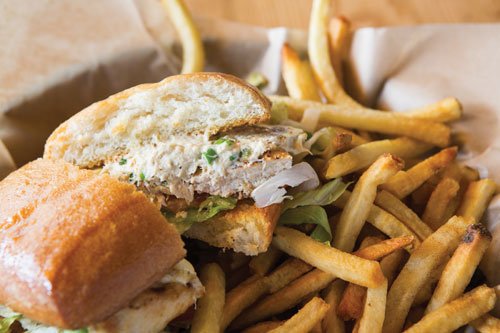
The Chesapeake sandwich is a good example of what works for this type of concept: A chicken breast resting on a buttery bun with a slathering of crab dip. The dip, creamy with enough heat to keep it interesting, pulls it together. But, when considering the mission of this restaurant is to honor local land, the sandwich erupts as a mistreatment of the most famous animal of our region. And in spring, crab ships from as far as the Gulf, says Stratmeyer. What restaurant uses this star of the bay by shoving it in a sandwich to play a supporting role to fowl?
Besides this misuse, there are other glaring omissions of the Delmarva Peninsula, including seasonally appropriate vegetables and seafood (oysters!). Spring produce was missing from a breakfast pizza, described as using “seasonal veggies,” offering summery zucchini and red peppers when asparagus, ramps or leeks would have showcased what grows here, now. Rockfish will soon be on the menu though, as well as ribs, just like what Stratmeyer remembers from road stops down the coast. It’s a menu grasping for childhood memories, for something real. But what works on the side of the road—an authentic experience tied to the land—can’t be mass-produced.
NOTES
DelMarVa Southern Cafe & TapHouse
SCOOP
Snack on the salty fried pickle chips
DISHES
Sandwiches, burgers and entrees: $6.69-21.49.
OPEN
Lunch and dinner daily, brunch Saturday & Sunday.
46300 Cranston St., Sterling; delmarvassoutherncafe.com
(June 2013)


